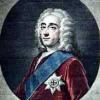Lord Chesterfield

Lord Chesterfield
Philip Dormer Stanhope, 4th Earl of Chesterfield KG PCwas a British statesman, and a man of letters, and wit. He was born in London to Philip Stanhope, 3rd Earl of Chesterfield, and Lady Elizabeth Savile, and known as Lord Stanhope until the death of his father, in 1726. Educated at Trinity Hall, Cambridge, he subsequently embarked on the Grand Tour of the Continent, to complete his education as a nobleman, by exposure to the cultural legacies of Classical antiquity and...
ignorance understanding weak
Nothing convinces persons of a weak understanding so effectually, as what they do not comprehend.
believe ignorance thinking
The herd of mankind can hardly be said to think; their notions are almost all adoptive; and, in general, I believe it is better that it should be so; as such common prejudices contribute more to order and quiet, than their own separate reasonings would do, uncultivated and unimproved as they are.
education ignorance perspective
A weak mind is like a microscope, which magnifies trifling things, but cannot receive great ones.
wise time ignorance
Young men are apt to think themselves wise enough, as drunken men are apt to think themselves sober enough.
ignorance knowledge pride
Our conjectures pass upon us for truths; we will know what we do not know, and often, what we cannot know: so mortifying to our pride is the base suspicion of ignorance.
ignorance knowledge people
A seeming ignorance is very often a most necessary part of worldly knowledge. It is, for instance, commonly advisable to seem ignorant of what people offer to tell you; and, when they say, Have you not heard of such a thing? to answer, No, and to let them go on, though you know it already.
ignorance government errors
Absolute power can only be supported by error, ignorance and prejudice.
learning heart ignorance
A learned parson, rusting in his cell at Oxford or Cambridge, will reason admirably well on the nature of man; will profoundly analyse the head, the heart, the reason, the will, the passions, the sentiments, and all those subdivisions of we know not what; and yet, unfortunately, he knows nothing of man.... He views man as he does colours in Sir Isaac Newton's prism, where only the capital ones are seen; but an experienced dyer knows all their various shades and gradations, together with the result of their several mixtures.
ignorance ignorant
The most ignorant are the boldest conjecturers.
ancestry breeding brute good scholar soldier
The scholar without good breeding is a nitpicker; the philosopher a cynic; the soldier a brute and everyone else disagreeable.
attention contempt due inside man proper relation
Due attention to the inside of books, and due contempt for the outside, is the proper relation between a man of sense and his books.
alone athletes manners mind necessary oil prepare strength
Prepare yourself for the world, as the athletes used to do for their exercise; oil your mind and your manners, to give them the necessary suppleness and flexibility; strength alone will not do.
almost man woman
Every man is to be had one way or another, and every woman almost any way
account admitted ask company considered dances deep drink esteem exclude great ideas invite joking merit merits plays respected sake sings sought whoever
Whoever is admitted or sought for, in company, upon any other account than that of his merit and manners, is never respected there, but only made use of. We will have such-a-one, for he sings prettily; we will invite such-a-one to a ball, for he dances well; we will have such-a-one at supper, for he is always joking and laughing; we will ask another because he plays deep at all games, or because he can drink a great deal. These are all vilifying distinctions, mortifying preferences, and exclude all ideas of esteem and regard. Whoever is had (as it is called) in company for the sake of any one thing singly, is singly that thing, and will never be considered in any other light; consequently never respected, let his merits be what they will.